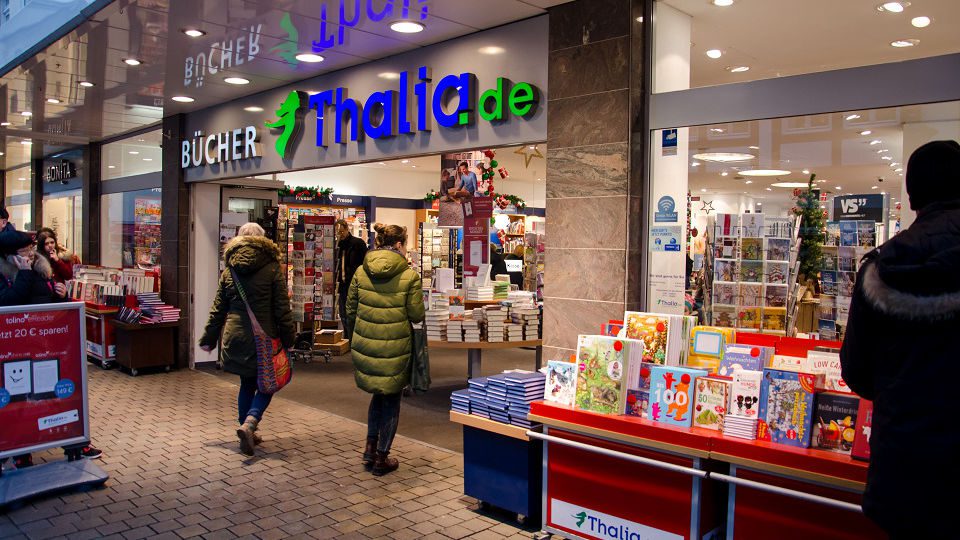 “We’re all in this together” has been something of an unofficial motto during COVID-19, but the executives at the German bookselling giant Thalia put action behind those words.
“We’re all in this together” has been something of an unofficial motto during COVID-19, but the executives at the German bookselling giant Thalia put action behind those words.
When the coronavirus forced the closure of its 400 brick-and-mortar stores, Thalia had a robust e-Commerce operation to fall back on — but dozens of independent booksellers did not. That realization was the impetus behind Shopdaheim, German for “Shop at Home,” a platform that Thalia set up to connect local independent bookstores throughout Germany with online customers.
During a World Retail Forum interview conducted by Consumers in Motion CEO Dan Hodges, Dr. Leif Erik Göritz, Chairman of the Supervisory Board at Thalia, revealed why and how the retailer decided to help companies that are also competitors.
Dan Hodges: What was the motivation for setting up the Shopdaheim platform?
Advertisement
Dr. Leif Erik Göritz: What we came to realize very quickly, once the shops were closed down, was that walking through the inner city while shops are closed suddenly feels empty, it feels scary. It shows you what our inner cities will look like if we’re all only shopping online. With that observation, we thought ‘Okay, if there is a time to educate the consumer that if you only shop online there’s not going to be an inner city anymore, it’s now.’
So we decided to launch a platform with a very startup/entrepreneurial approach. Michael Busch, the CEO of Thalia, had the idea: To demonstrate to people that they can do something if they want to support the local retailer, then educate the consumer that there are other options than the two or three major shopping platforms. Most of these small shops actually had a web site, but [consumers] just don’t remember to go to it because it’s so convenient to buy on the two or three sites where they always shop.
So we launched the Shopdaheim web site, and despite the fact that we obviously had an interest to put our 400 Thalia shops on it, Michael immediately had the idea to say ‘OK, we put every bookstore in the German market on that web site.’ He liaised with the big service providers for the other bookstores and we just took all the shop web sites, all the shop addresses of every independent bookstore and all the other chains. If somebody wanted to opt out, they could opt out. Two of the smaller regional chains in Germany already had agreed to join in.
We invested money to make this happen and we provided the infrastructure, and we did that basically pro bono. If any one of the guys who joined saw that they really had a sales uplift through the web site, we asked them not to give us money, but to help another coronavirus initiative in their region — with a monetary donation, whatever they can.
Every retailer’s struggling right now, but we really tried to make an aggressive movement to make sure that other people are empowered. And if somebody is benefiting from it and they can do it, they should empower other small initiatives in their local region.
Hodges: How did the project gain momentum?
Göritz: We had a lot of positive media feedback, including from the biggest Germany-based media group. They gave us a lot of positive publicity and free advertisements, because they said ‘We do need local retail, those are the guys advertising in our newspapers, so let’s support them as well.’ Then other media players joined in, and logistics companies approached us to join. Intersport, the biggest group of independent sports shops, joined us. Now I think we have about 10,000 shops on it, which is fantastic for an independent grass roots movement with just two or three project managers working on it. And hundreds of thousands of consumers use the web site. That was the real aim, for us to really empower the consumer to shop locally.

Hodges: What are some of the key things you’ve learned from dealing with COVID-19?
Göritz: When companies talk about emergency measures, it’s very often a theoretical exercise. Very few companies, including us, have these mechanisms in place, or if you do it’s sort of halfhearted — you have a data protection officer sitting somewhere in a closet rather than being empowered. What really helped us was that once we turned the switch, we set up a crisis management board for making all our decisions. Any major decision was run through the crisis team. The CEO and Chairman of the Supervisory Board were sitting on the board, and we had dedicated crisis managers. So there was no delay in terms of decision-making.
Now, we’re taking the learnings that we had while running under difficult conditions with corona, and seeing where we had hiccups. We’re doing a full review of what needs to be improved if we have another shutdown. We want to have these procedures in place so that we can know: What can we switch? What can we do? How can we interact?
We also realized that we have to get the contact details of customers. We have to try to get their opt-in [for sharing that information]. Where before it was a nice-to-have, now it’s a need-to-have. There’s no excuse any more. What we did online, what we did with telephone marketing, that was our lifeline for the stores.
Hodges: What advice would you give other retailers?
Göritz: They need to make sure that their contracts are more flexible and include pandemic clauses. Make sure that you really know your fixed costs if you have to shut down. That will be a big challenge in the entire retail sector. You will face situations where you have a lot less footfall and you will make a lot less revenue. How do you readjust those contracts in the long term so that you can sustain your business and manage to survive on decreased revenues?
Hodges: It sounds like you’re talking about a new business model, an organization that can flex up or flex down based on a new way of operating.
Göritz: What happened with corona is a fast-forward by five years of megatrends. The scary part is, we don’t have five years to prepare any more, it’s happening in the next 12 months. That will impact all parts of retail, in terms of industry consolidation and the shift to shopping online. I think it would be very optimistic to hope that we come back to pre-corona levels in terms of footfall and spending — particularly spending in inner cities and shopping centers.
So now is the right time to make radical changes to business models, because if you don’t do it now, there most likely is not going to be a chance to get it done later.














